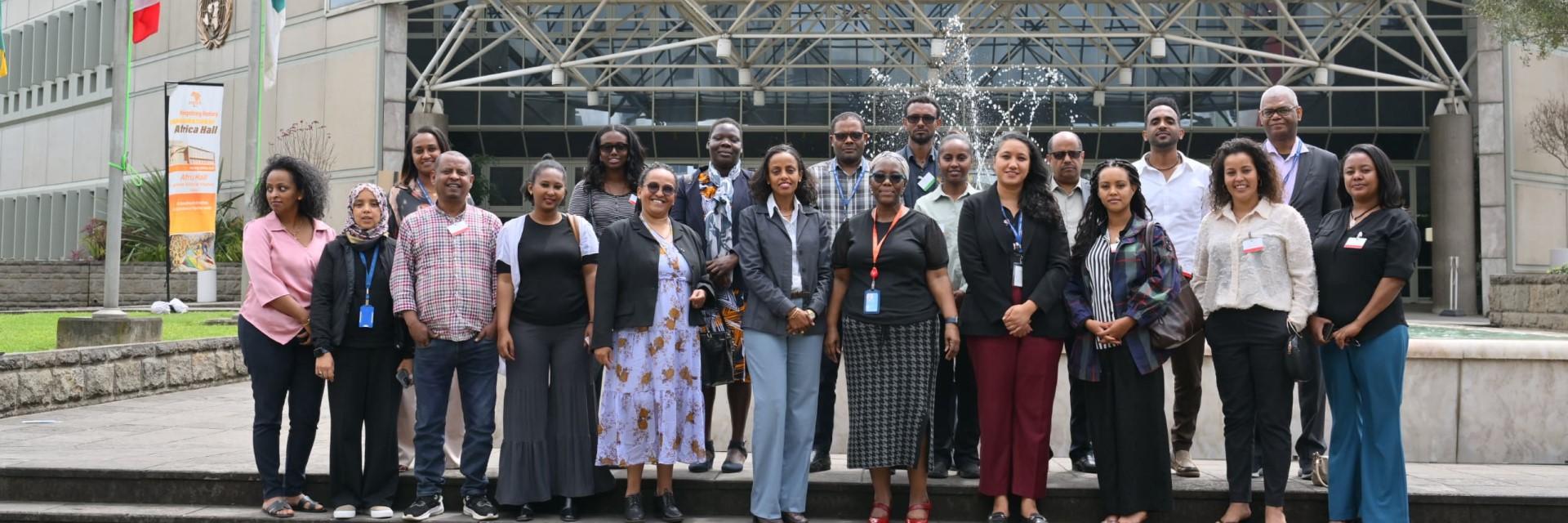Addis Ababa, 23 October 2024 (ECA) – A significant step towards empowering migrant women economically and protecting their human rights, the United Nations Commission validated findings of a national assessment on returnee migrant women particularly domestic workers from Ethiopia to The Gulf Cooperation Council (GCC). The findings were validated at a meeting held from 22-23 October 2024, that brought together participants from, AUC, UN agencies, government ministries ministry of Justice, Ethiopia statistical service, public sector CSO participants including BACO, BIRU, GIZ WISE, AWSAD, FINOT, Good Samaritan representatives of returnee migrant.
Addressing the meeting, Ms. Sweta C. Saxena, Director of Gender Poverty and Social Policy said: “When you are a woman and a migrant one at that – vulnerabilities just get compounded”.
The findings show that the multidimensional process of reintegration requires a holistic and needs-based approach at individual, community and structural level. Efforts require a comprehensive approach that empowers returnees to rebuild their livelihoods and contribute to societal resilience to be able to decide rationally to re-migrate as a choice not as a necessity. Commenting on the findings Ms. Keiso Matashane-Marite Chief of the ECA’s Gender Equality and Women’s Empowerment Section, noted: ‘Forming networks and business groups can empower migrant women to compete effectively in markets and access critical financial resources, both of which are essential for their economic empowerment and successful reintegration”.
The assessment of the situation of returnee migrant women in Ethiopia, commissioned by the ECA as part of the joint AUC/ECA project entitled “International migration in Africa: Shaping a positive narrative and removing barriers to mobility”, emphasizes Ethiopia's role as a source, transit, and destination country for migration. This includes significant movement within Africa, particularly to South Africa (12%), as well as to Middle Eastern countries such as Saudi Arabia (31%) and the United Arab Emirates (9%). However, many migrants return with feelings of hopelessness, and experience stigma, familial breakdowns, distress from debt bondage, and various financial challenges.
The Government of Ethiopia is making efforts through legal instruments such as the overseas Employment Proclamation No. 923/2016 [and its revised version 963/2023]; Prevention and Suppression of Trafficking in Persons and Smuggling of Migrants Proclamation No. 1178/2020 to investigate and prosecute traffickers who exploit victims within Ethiopia in sex trafficking or domestic servitude for exploitive labor. Similarly Bi-Lateral Agreement between Ethiopia and Kingdom of Saudi Arabia, May 2017 to protect the rights and benefits of Ethiopian domestic workers.
AUC migration expert Tapiwa Mucheri highlighted the growing recognition of the necessity of bilateral labour migration agreements in safeguarding the rights of labour migrants. Such agreements serve as essential tools outlining the rights and responsibilities of both workers and employers, thereby ensuring improved protections and working conditions for migrant workers. Furthermore, effective collaboration with missions and labour authorities in destination countries is imperative to uphold these protections. It facilitates the monitoring of agreement implementations and addresses potential violations or grievances. Ongoing communication and engagement between source and destination countries can empower labor migrants, equipping them with the resources needed to understand their rights and seek assistance when required.
In line with this Ms. Neha Choudhary, Technical Officer – Migration at ILO noted that, reinforcing the connection between bilateral labour migration agreements and the empowerment of labour migrants is critical. Stakeholders were encouraged to develop a migration framework that prioritizes the welfare of workers, benefiting not only the migrants themselves but also improving labour market dynamics in both sending and receiving countries by fostering fair labour practices and reducing exploitation. The importance of collectives and organization was reemphasized by returnee women: “Five years ago, there was no organisation fighting for returnees. Today we are at the United Nations speaking for ourselves - don’t give up on us, continue involving us.” Networking and organisation, heals most of us and helps us to reintegrate into society ‘We need more associations and gatherings for returnees to share their stories’
Despite ongoing efforts, and having a National Council on Migration, chaired by a Deputy Prime Minister, challenges persist. While progress has been made with reintegration directives, there remains a crucial need for a labor migration policy, given that a significant portion of migration (about 90%) is employment-seeking. The key drivers for migration remain economic in nature calling for comprehensive economic policy on migration and acknowledging of labor migration. It is the intention of the government to put in place such a framework to address the migration eco system through a comprehensive migration policy awaiting endorsement by the council of Ministers. According to experts once the migration policy is adopted, Ethiopia will have a good stand to implement.
Acknowledging that economic empowerment is critical to lessen the vulnerability of women and girls to migration and displacement related exploitation, abuse and other human rights related violations, participants call for economic policies that can create decent employment, as well as extend labour rights and social protection to those in informal employment, such as domestic workers. Nigest Haile, Founder and Executive Director of the Center for Accelerated Women's Economic Empowerment (CAWEE), emphasized that providing marketable skills through targeted training and securing job placements are crucial components in fostering women's economic empowerment.
Issued by:
Communications Section
Economic Commission for Africa
PO Box 3001
Addis Ababa
Ethiopia
Tel: +251 11 551 5826
E-mail: eca-info@un.org

